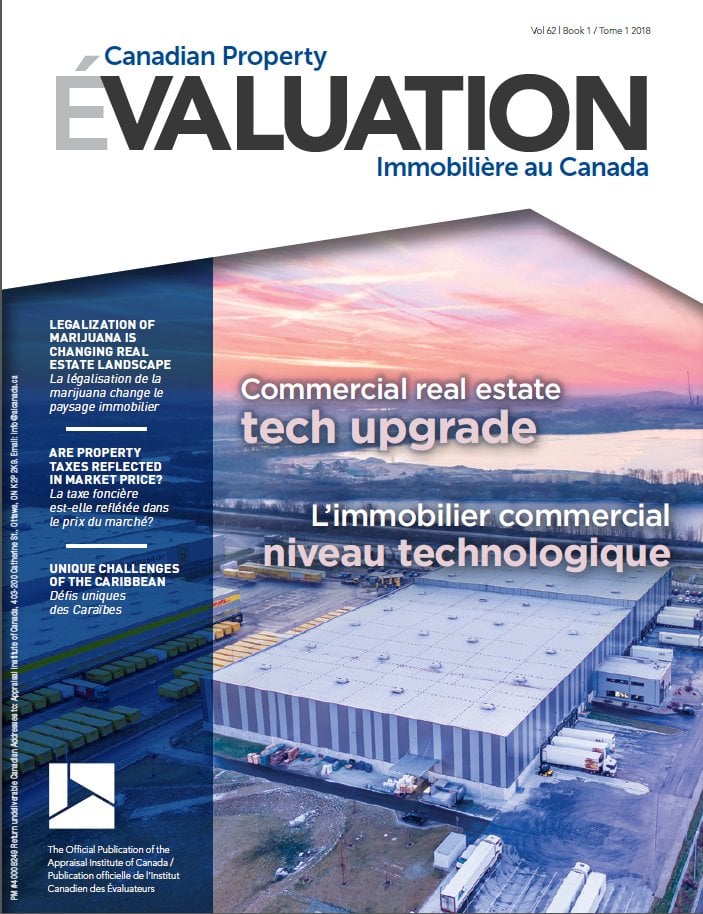Legal Matters: Revisiting the fee simple interest
Canadian Property Valuation Magazine
Search the Library Online
Revisiting the fee simple interest
In September 2017, the Appraisal Institute (US) held a Property Rights Symposium to consider issues relating to the valuation of fee simple estates. On December 21, 2017, a document entitled Property Rights Symposium Discussion Paper (Discussion Paper)[1] was prepared to report on the symposium discussions, to identify questions to be addressed and to solicit comment from interested parties.
The impetus for the Discussion Paper is the perception that the requirements for valuing the fee simple interest have become muddled. For example, what does the notion of ‘unencumbered’ mean in the context of valuing the fee simple interest? An example of the questions posed in the Discussion Paper is the following:
Does fee simple mean vacant and available for lease or occupancy? If so, should deductions be taken for lease-up and cost? Does fee simple imply a ‘go dark’ scenario?
The authors provide three examples where understanding the valuation requirements for the fee simple interest is critical:
- expropriation;
- real property assessment and taxation; and
- mortgage lending.
Canadian context
One might have thought that, in ‘market value’ jurisdictions in Canada, such questions as posed in the Discussion Paper are largely settled. For example, the litigation in Ontario and British Columbia show a judicial bent for valuation based on the assumption of stabilized operations with leases in place at economic/market rents.
The Assessment Act, R.S.O. 1990, c. A.31, section 1(1) defines ‘current value’ as “… the amount of money the fee simple, if unencumbered, would realize if sold at arm’s length by a willing seller to a willing buyer,” Section 19(1) requires assessment based on current value. In BCE Place Ltd. v. Municipal Property Assessment Corp., Region No. 9 [BCE], 2009 ONCA 672, the Ontario Assessment Review Board held on the evidence presented that ‘unencumbered’ meant a vacant building on the valuation date with a two-year lease up period. The Divisional Court and the Court of Appeal disagreed. Assessment on the basis of market value involves an assumption of leases in place at market rents as at the valuation date.
The Assessment Act, R.S.B.C. 1996, c. 20, section 19(1) defines ‘actual value’ as the “market value of the fee simple interest in land and improvements.” Standard Life Assurance Co. v. Capital Assessor, Area No. 01, 1997 CarswellBC 1020 (B.C.C.A.) [Standard Life] is the leading case in British Columbia affirming that assessment is based upon the assumption of market rents for leases in place as at the date of valuation. Discovery Parks Inc. v. Assessor of Area #10, 2006 BCSC 1442 is another of the many examples where the courts accept economic rents and stabilized vacancy and expense ratios as leading to the value of the fee simple interest.
But the law does not remain stagnant and there are new twists on old questions from time to time. In this regard, one wonders about the future impact of Five Mile Holdings Ltd. v. Area 10 (2014 PAABBC 20140278) [Five Mile], where the British Columbia Property Assessment Appeal Board considered whether an easement registered against title should be taken into account in determining market value of the fee simple interest in the appealed property.
The Board began with the meaning of fee simple interest as set out in The Appraisal of Real Estate: 2
The most complete form of ownership is the fee simple interest – i.e., absolute ownership unencumbered by any other interest or estate, subject only to the limitations imposed by the four powers of government: taxation, expropriation, police power and escheat.
The Board relied upon Standard Life to interpret ‘actual value’ as the market value of the unencumbered fee simple interest:
[8] The ‘fee simple interest’ in real property is the broadest private property interest known in law. It encompasses absolute ownership unencumbered by any other interest or estate, subject only to the limitations imposed by the governmental powers of taxation, expropriation, police power and escheat …
[9] In Standard Life… , [t]he Court described the fee simple interest as being comprised of the entirety of the interests in a property and, generally speaking, being the same as the owner’s unencumbered interest …
[10] … any positive or negative value associated with an easement represents the value of a partial interest in land. Any effect on the market value of the servient tenement reflects loss of one of the rights comprising the whole of the bundle of rights that makes up a fee simple interest. Therefore, while an easement could potentially affect the market value of an owner’s encumbered interest in property, that effect must be ignored for assessment purposes.
The Board explained further at paragraph 16:
[16] Even though an easement may run with the land and bind future purchasers, it is still an encumbrance to the fee simple. A subsequent purchaser purchases an encumbered bundle of rights. The price paid reflects the market value of the fee simple encumbered by the easement … Unless that encumbrance arises from the actions of a governmental, taxing, or expropriation authority, any impact on market value need not be considered for assessment purposes. Actual value for assessment purposes must reflect the market value of the unencumbered fee simple interest without regard to any effect on value due to the transfer of a partial interest.
Observations and suggestions in the Discussion Paper
After setting out questions and providing discussion, the authors of the Discussion Paper propose a new definition for ‘fee simple estate;’
Fee simple estate. The highest estate allowed by law. An inheritable ownership interest of indefinite duration.
The authors also recommend discontinuance of the terms ‘leased fee’ and ‘leased fee estate.’
The basis for the recommendations is the hope that the proposed definition and the discontinuance of other terms will reduce or eliminate the possibility for confusion. The authors point to the tussle between valuing a property as if vacant or as if leased at market rents. Reference is also made to Black’s Law Dictionary as a source for a legal definition of ‘fee simple interest.’ The authors suggest that the focus has turned away from the duration of the interest to a focus on the presence or not of encumbrances.
As for the implications of the proposed definition the Discussion Paper states: “The proposed revision of the definition would make it more consistent with the definition in Black’s Law Dictionary and with its general use in other areas of real estate practice. Under the proposed definition, fee simple estate would refer to the duration of a possessory right, not to which interests may or may not encumber that estate. The interests associated with the real estate are of course highly relevant to the appraisal assignment. But merely identifying the rights appraised as the ‘fee simple estate’ does not settle the appraiser’s question about whether any actual or hypothetical interests, such as lease or easements, are to be included. A significant implication of this proposed definition is that the valuer likely would need to identify not only the ownership estate (fee simple, leasehold, life estate), but also the interests associated with the property to be valued.”
The Discussion Paper concludes with the following:
Potential implications of these proposals are that valuers would need to determine, and valuation reports clearly state, the estate … as well as the actual or assumed interests associated with the real estate that are reflected in the valuation …
Closing
Would the appraisal and legal professions and our clients be better served by the proposed or some other definition of ‘fee simple interest?’ Does it make universal sense to change the definition to focus on the duration of the interest rather than encumbrances?
If the appraisal profession is to adopt a different definition of ‘fee simple interest,’ this will not change the law as it presently exists. The definition of ‘fee simple interest’ will still be determined in accordance with existing case law. It might be possible to reconcile a new appraisal definition of ‘fee simple interest’ with existing legal definitions, but only time will tell. If there is to be change in the law, it will happen incrementally, generating a relative degree of uncertainty while the cases raising the issues are litigated through the courts and tribunals.
End notes
[1] Available on the Appraisal Institute website.
2 The Appraisal of Real Estate, 3d. Cdn. ed. (Vancouver: Appraisal Institute of Canada & Appraisal Institute (Sauder School of Business – Real Estate Division), 2010), p. 6.1
This article is provided for the purposes of generating discussion and to make practitioners aware of certain challenges presented in the law. It is not to be taken as legal advice. Any questions relating to the applicability of cases referred to in the article in particular circumstances should be put to qualified legal and appraisal practitioners.





